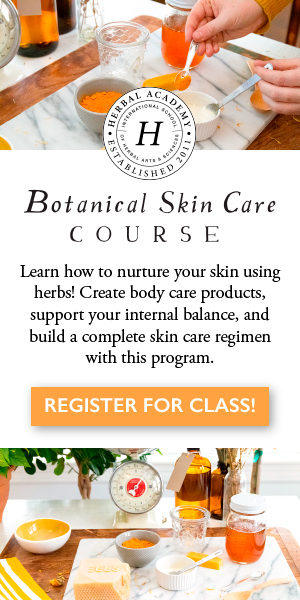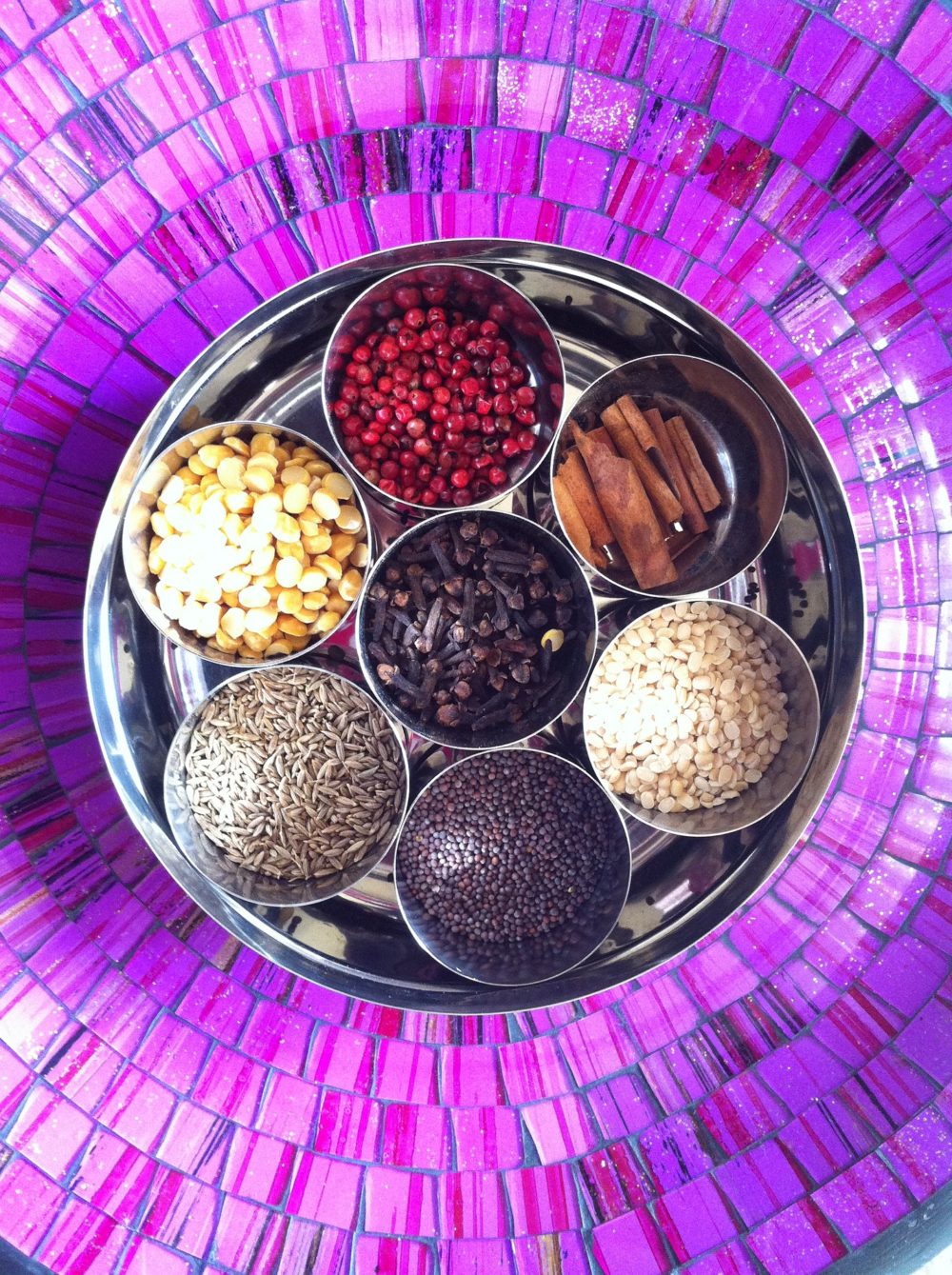
by Leslie Moldenauer | | Essential Oils, Spirit
Are you familiar with the dosha’s in Ayurvedic practice (Vata, pitta, kapha)? If so, let’s move forward to get some basics surrounding each one of the dosha’s, and how you can help to find and maintain balance in your life.
If you do not know what your dosha is and want to find out, take this quiz here, then come back and read on.
Vata:
Vata types tend to be chilly, have dry skin, and are light. What I mean by light is somewhat flighty, and ungrounded.
Vata’s are governed by movement, the nervous system, and overall elimination.
Vata’s in balance have an abundance of energy, a highly creative mind, and are very lively and enthusiastic.
On the other end, vata’s out of balance tend to suffer from constipation, restlessness, insomnia, anxiety, and challenges in their digestive system.
Helping Vata to Find Balance
A primary consideration for Vata types is working to stick to a routine in all things: diet, work, exercise, sleep, and play. Vata’s should try to stay warm, as they tend to be thin and cold. A nice hot cup of herbal tea is a good idea as a calming routine to find balance. Examples would be a tea containing ginger as a warming herb, or a nice glass of warmed turmeric milk (recipe below from Wellness Mama).
- 2 cups of milk of choice (almond, pecan, coconut, and dairy all work in this recipe)
- 1 teaspoon Turmeric or Turmeric Spice Mix
- ½ teaspoon Cinnamon
- 1 teaspoon raw honey or maple syrup or to taste (optional)
- Pinch of black pepper (increases absorption)
- A tiny piece of fresh, peeled ginger root or ¼ tsp ginger powder
- Pinch of cayenne pepper (optional)
- First, blend all ingredients in a high-speed blender until smooth.
- Then, Pour into a small saucepan and heat for 3-5 minutes over medium heat until hot but not boiling.
- Drink immediately
Original recipe here
A morning practice of Abhyanga is also very helpful, using slightly warmed oil. Follow this link to learn more about this practice. You can use an essential oil blend if you so choose.
Here is an idea:
Frankincense Boswellia serrata (grounding) 3 parts
Vanilla bourbon CO2 Vanilla planifolia (calming) 2 parts
Black pepper Piper nigrum (warming) 1 part
Dilute properly in your carrier oil
**Always check contraindications before use.
Pitta
Pitta types tend to run hot, are intense personalities, have strong digestive systems (hot pepper? no problem) and have a strong sex drive.
Pitta’s are governed by their strong digestive fire, metabolism, and overall fiery nature that can manifest in not only the body but the mind as well.
Pitta in balance has beautiful skin complexion, strong digestion, and abundant energy.
Pitta out of balance can have skin issues (rashes), heartburn and indigestion, and the fire of the body and mind goes into overdrive, causing sweating, irritability, and short-temperedness.
Helping Pitta to Find Balance
When the outdoors are hot, seek the cooling indoors, shade, or a nice dip in the water. Balance and rest are key when hot. Cooling foods will go a long way such as fruits or cucumber and drinking plenty of liquids (skip the alcohol).
Pitta needs to remember to not take life so seriously, and let go of the need to be so tidy and organized. Live a little!
When using carrier oils, choose the cooler ones such as coconut, almond, or olive.
Cooling hydrosol facial mists containing cucumber or peppermint hydrosol are a winner for every pitta.
A cooling massage oil can help to soothe the fiery soul of a pitta:
Spearmint (cooling) Mentha spicata 3 parts
Lavender (soothing) Lavandula angustifolia 2 parts
Eucalyptus (cooling) Eucalyptus radiata 1 part
Dilute properly in your carrier oil
**Always check contraindications before use.
Kapha
Kapha types are typically heavy, slow, solid, and tend to have oily skin.
Kapha types are governed by the overall structure of the body. The primary function is protection.
In balance, Kapha is strong with excellent stamina. They have large, soft loving eyes, and radiant skin. They tend to have thick and shiny hair. In balance, they have brilliant sleep habits and regular digestion.
However, when Kapha is out of balance, they tend to be overweight, sleep becomes either excessive or scant, they can easily become depressed and allergies tend to manifest in the form of sinus issues, skin rashes and the like.
Helping Kapha to Find Balance
Kapha needs consistent activity. Variety in exercise is great as they tend to get bored quickly…otherwise “change” is not a good word for Kapha types, so keeping a routine is good. This does not mean a vacation from the daily routine is a bad thing; hard working Kapha NEED breaks just as much as they NEED routine.
Kapha’s should maintain a regular sleep schedule, wake early, and avoid the afternoon nap. Kapha tends to dislike extreme heat or cold, and like somewhere in the middle.
A neti pot routine is great for all dosha’s, but Kapha needs assistance when allergies are at their high to keep cleansing the sinuses.
Kaphas should avoid clutter and keep things organized to stay calm. And remember, exercise is key for all Kapha’s.
Kapha’s should choose a stimulating aroma’s. Here is an idea:
Sweet marjoram Origanum majorana (bright and stimulating) 3 parts
Sweet orange Citrus sinesis (bright and cheery) 2 parts
Chamomile Roman Anthemis nobilis (balancing) 1 part
Dilute properly in your carrier oil
**Always check contraindications before use.

Please note that I am not a medical practitioner. The content of this website is provided for general informational purposes only and is not intended as, nor should it be considered a substitute for, professional medical advice. Do not use the information on this website for diagnosing or treating any medical or health condition. If you have or suspect you have a medical problem, promptly contact your professional healthcare provider. By using this website, you assume full responsibility and liability for your own actions.

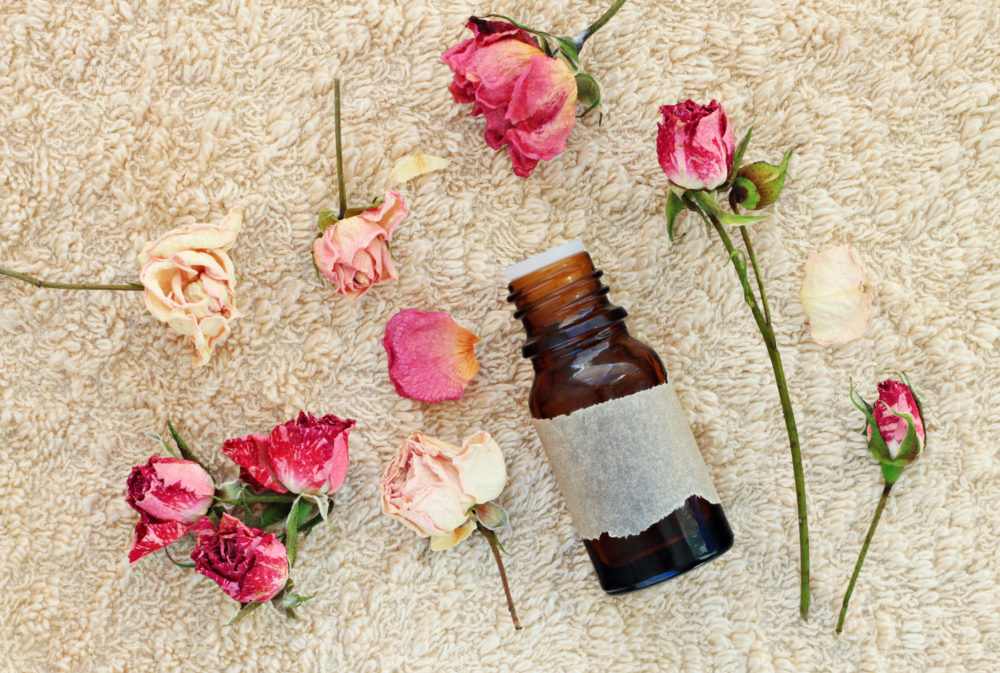
by Leslie Moldenauer | | Essential Oils
Hi everyone! Welcome back and happy new year to you. I want to take a moment to thank everyone that has been a part of my journey over the last few years. My followers have quadrupled and in turn it has truly sparked my love for writing, I am so grateful for the path I am on.
All of you know that safety surrounding essential oils and the practice of aromatherapy is my passion. Keeping all of you safe is so incredibly important to me, but that is not all that I have a passion for.
I am passionate about self-care and self-improvement. I am always reading books about life; betterment, spirituality and ways to improve this life experience. I have wonderful friends that I cherish and adore. I practice yoga and meditation and have for over 10 years, and I LOVE to dance to move and shift negative energy. I take what works with me on my path and leave what doesn’t.
Aromatherapy is a passion of mine for its breath and depth, all of its many facets and colors; I am much more than a safety specialist.
To date, my absolute favorite aromatherapists are ones that like to bring focus to the esoteric uses of the oils. My two favorite books are ones written by Robbi Zeck and Gabriel Mojay.
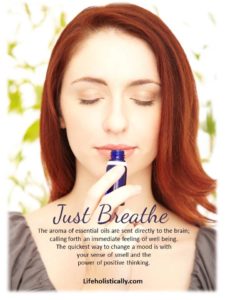
I love how essential oils make me feel. I love their energy, and I treasure how they bring so many of us together for one true cause, happiness! Essential oils act as a bridge to bring together body and mind, to help us reach new levels of awareness, and are truly a doorway to learning more about ourselves. They are healers of our spirit.
I invite you to go and grab that one essential oil right now that can consistently bring you peace. That essential oil that can settle your thoughts and soften your heart. I will wait……………………………..
Now sit in a comfortable position and follow one of the links below. Ready? No outside noises here, headphones may be important. Hit play when you are ready, bottle under nose…and soar. (You can also lay in corpse pose and start your favorite diffuser). Whatever position that will leave you the most comfortable without falling asleep. If thoughts come into you head, acknowledge them and then gently let them go.
Nature Sounds
Meditation Music
Healing Tibetan Bowls
There are many more sides to me that you will all get to see a sneak peek into in 2017. I hope you enjoyed this exercise! Love to you all!
Life can be hard…..but aromatherapy is better!

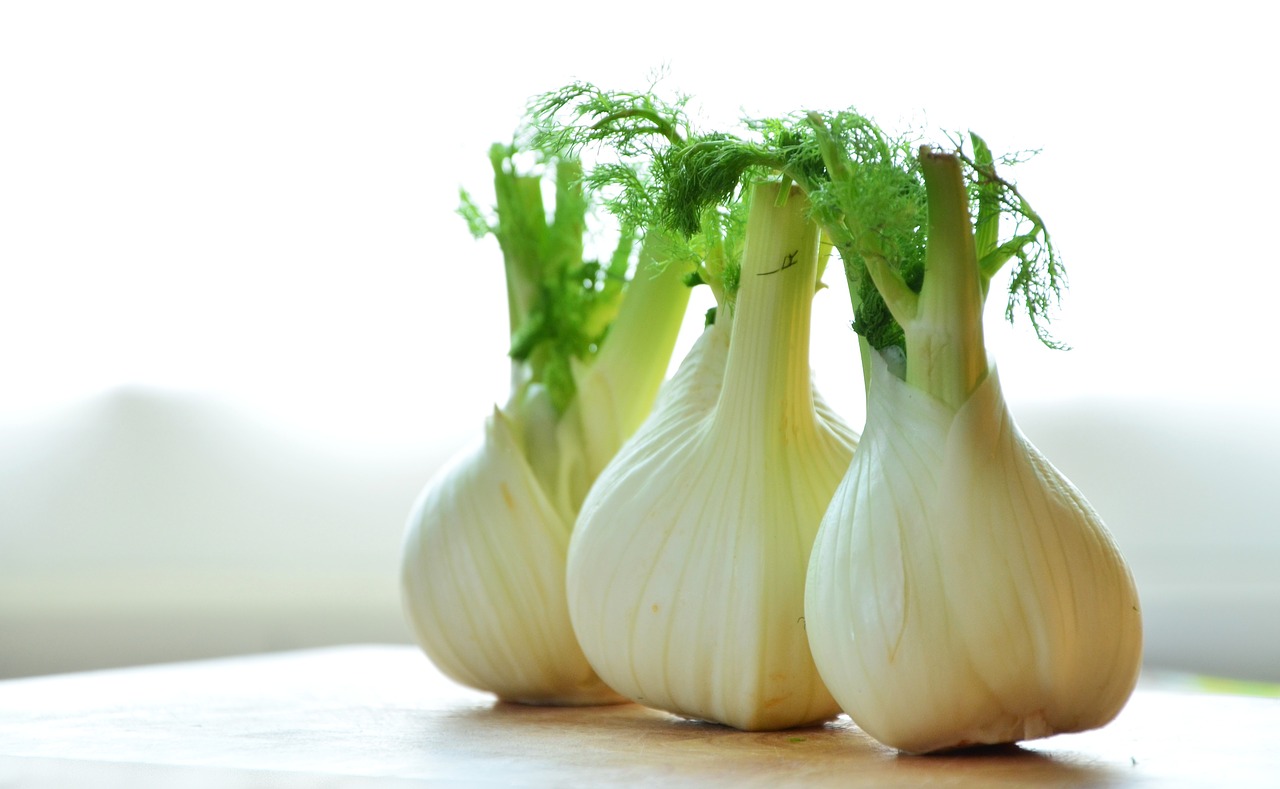
by Leslie Moldenauer | | Essential Oils, Herbs
When you receive health advice on the Internet, on social media, or even in your social circles, do you question it? Do you check its validity as well as its safety for you? For your children? For your loved ones and even your furry friends?
There are a few things that you need to consider:
1-Is the information accurate? Has it been properly vetted to be sure?
2-Is is safe? Have you checked multiple sources?
3-The information may have worked for that person, do you have medical conditions that they don’t? How about medications, are you taking any medication that may conflict?
In the aromatherapy industry, as well as the herbal industry, advice can be given based on a testimonial. This word, “testimonial”, has become quite a trigger word. Please do not take advice based on “it worked great for me”, or my favorite, “I have been doing it for years and nothing bad has happened to me”. How do they know that exactly? What qualifies them to give that advice? Is a testimonial based on scientific factors or even education? Of course not.
Today I would like to talk about something that happens quite often in the aromatherapy industry, and that is comparing the therapeutic qualities and more importantly the safety of an herb compared to its essential oil counterpart.
An administrator of a Facebook group contacted me today to field a comment/bad advice that was given on a thread in her group as she has done dozens of times before. The comment was given on this very question verbatim:
“Any suggestions to up Mama’s milk supply? Thanks in advance”.
This type of question for starters can be tricky all in itself. What is the health of the mother? Any medical issues? Taking any medications? Was the baby full term? Does baby have any issues? …….The comment that threw off the administrator, and rightly so was:
“Fennel essential oil rubbed above the breast”.
Fennel Foeniculum vulgare Essential Oil During Breastfeeding
First and foremost, fennel essential oil is contraindicated during pregnancy as well as lactation. To be clear, according to the Merriam Webster dictionary, a contraindication is: “something (such as a symptom or condition) that makes a particular treatment or procedure inadvisable” (1). Fennel essential oil, specifically the constituent (E)-anethole, is a known hormonal modulator (2). This is essentially a substance that regulates the hormones of the body. Why is this an issue? Much of our body relies on an extremely precise conversation between the central nervous system (CNS) and hormones.
Hormones regulate essentially all body functions, for the purposes of this article I will focus on reproductive functions.
Hormonal changes associated with our moon cycle may bring about the following temporary conditions: tender nipples, irritability, unsettled feeling, or increased moodiness in mother, headaches (often associated with PMS), a slight dip in milk supply (usually not a big problem), slight change in taste of mother’s milk, (depends on the nursling whether or not this will cause an aversion to nursing), and the hormone prolactin that is responsible for mother’s letdown and overall production of milk, enabling her to feed her nursling (3).
You can compare this hormonal modulation to the birth control pill. Doctors will not place you on a birth control pill containing estrogen as a newly lactating mother, simply because of the altering of hormones. An OB/GYN doctor will typically prescribe a progesterone only pill, or recommend waiting all-together, as there are so many unknowns involved during this time. I speak from experience in these areas. Any mother that is sensitive to a shift in hormones due to specific cancers, endometriosis, and uterine fibroids can be placed under higher risk here (4).
Robert Tisserand stated in his recent book, Essential Oil Safety 2e (2014), that fennel essential oil may also be carcinogenic based on its estragole content (fennel contains up to 5% estragole) See noted pages below for your review (5).
Whether or not fennel essential oil even has the capability to increase milk production is a moot point, as safety or in this case lack of safety for mom and baby, outweigh any possible, potential benefit.
What About Fennel The Herb?
Fennel, the herbal counterpart, appears to carry with it a certain amount of risk as well. According to WebMD:
“during breast-feeding, fennel is POSSIBLY UNSAFE. It’s been reported that two breast-feeding infants experienced damage to their nervous systems after their mothers drank an herbal tea that contained fennel”.
Is this a stretch? Possibly..maybe…(6)
WebMD also states that fennel IS likely safe when consumed in amounts found in food (7). So keep in mind, when consuming fennel herb to increase milk supply, it can be in amounts found larger than what one would consume in food.
They go on to further say avoid fennel in these instances:
“Bleeding disorders: Fennel might slow blood clotting. Taking fennel might increase the risk of bleeding or bruising in people with bleeding disorders. Hormone-sensitive conditions such as breast cancer, uterine cancer, ovarian cancer, endometriosis, or uterine fibroids: Fennel might act like estrogen. If you have any condition that might be made worse by exposure to estrogen, do not use fennel” (8).
In Closing
I felt that it was important to address this topic in more detail as it is shared so easily without much understanding of the safety issues involved. It is recommended to avoid fennel essential oil during pregnancy and lactation, and utilize caution with the herb in levels more than what would typically be consumed in food. Congratulations to all mom’s out there embarking on a beautiful time with your new little bundle of joy. Stay tuned for future articles on what IS considered a safe way to increase mothers milk. Until then, stay safe!

References
(1) (5) Tisserand, R., Young, R., Essential Oil Safety2e (2014) (p277-278)
(2) Definition of a contraindication: https://www.merriam-webster.com/dictionary/contraindication
(3) About Hormone Imbalance. Retrieved from
About Hormone Imbalance
(4) Fennel: https://www.uwhealth.org/health/topic/multum/fennel/d04493a1.html
(6) (7) (8) WebMD Fennel. Retrieved from: http://www.webmd.com/vitamins-supplements/ingredientmono-311-fennel.aspx?activeingredientid=311&activeingredientname=fennel

BEFORE YOU GO! Remember to sign up for my FREE Facebook group! Hang out with me and THOUSANDS of other Essential Oil lovers looking to learn, click on to join Real Essential Oil Education Group!
Check out my FREE offer below!
Like so many practices in life I encourage you to become educated on the proper use of essential oils. When using them, please do so cautiously, understanding that there is often misinformation on the internet. You can be assured that I support only educated and proven resources. While essential oils should not be feared they should be respected and used properly to ensure the safety of the individuals using them.
Please note that I am not a medical practitioner. The content of this website is provided for general informational purposes only and is not intended as, nor should it be considered a substitute for, professional medical advice. Do not use the information on this website for diagnosing or treating any medical or health condition. If you have or suspect you have a medical problem, promptly contact your professional healthcare provider. By using this website, you assume full responsibility and liability for your own actions.
Utilizing Essential Oils During Labor and Delivery
Postpartum Depression..The Importance of Asking for Help
by Leslie Moldenauer | | Essential Oils
The graphic says it all. Please read and share. Do not participate in this “therapy”.
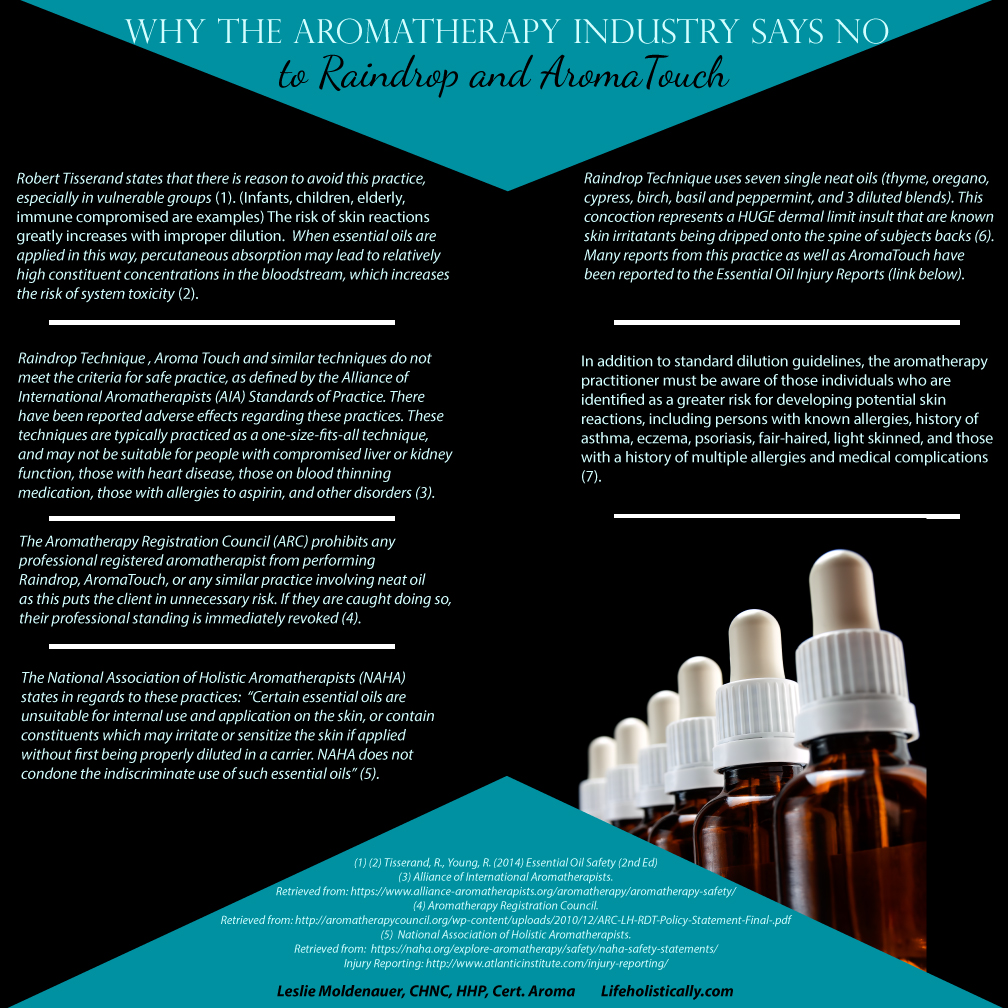
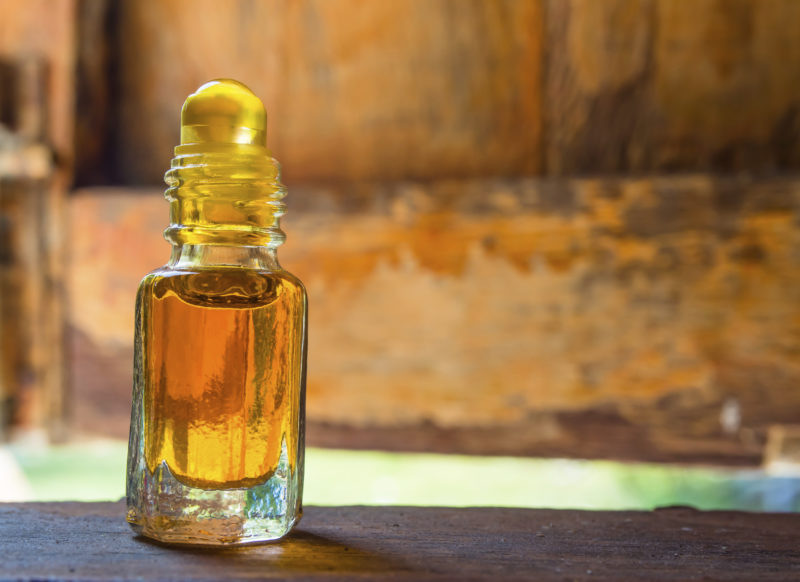
by Leslie Moldenauer | | Body, Cleansing, Essential Oils
Abhyanga, or annointing yourself from head to toe with warmed oil, is an ancient form of self-love, and is a beautiful practice to do every day for well-being and �longevity. �
Depending on the type of oil you use, you will likely want to do this before a shower. Your blend will also dictate whether you use it before you start your day-invigorating, or before bed-for restful sleep.
There is not “one” way to accomplish the goal. This daily �practice is said to balance the dosha’s in Ayurveda, and keep you incredibly grounded in the present.� (Link below for more details on the doshas)
“The body of one who uses oil massage regularly does not become affected much even if subjected to accidental injuries, or strenuous work. By using oil massage daily, a person is endowed with pleasant touch, trimmed body parts and becomes strong, charming and least affected by old age”
Charaka Samhita Vol. 1, V: 88-89 (One of the Great ancient texts of Ayurveda)
Make sure you are in a warm, comfortable space. If you enjoy a piece of music, now would be a good time to play it. You “can” run the diffuser, but since you are making up a massage oil blend, it is not necessary. Do not leave any body part out.
Move slowly with �intention in circular strokes, chopping motions, whatever feels good. Do not make this a mindless practice, stay present and �feel all there is to feel.
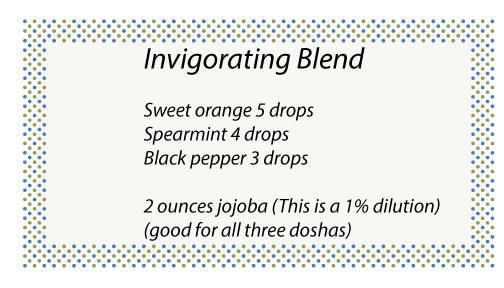
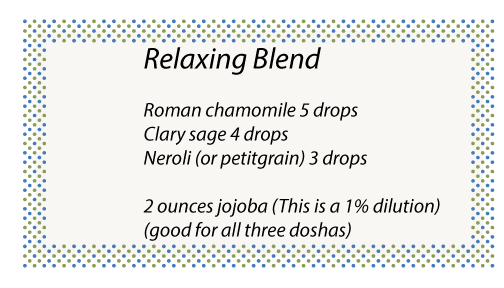
***As I am not aware of your medical condition, please be sure to research the oils listed to make sure they do not have any contraindications for you.
Click here for more self-care tips incorporating mind body balance and aromatherapy.
References:
Benefits of Abhyanga
Understanding the Doshas
Please note that I am not a medical practitioner. The content of this website is provided for general informational purposes only and is not intended as, nor should it be considered a substitute for, professional medical advice. Do not use the information on this website for diagnosing or treating any medical or health condition. If you have or suspect you have a medical problem, promptly contact your professional healthcare provider. By using this website, you assume full responsibility and liability for your own actions.


by Leslie Moldenauer | | Essential Oils
Essential Oil and Confirmation Bias. Confirmation bias is a propensity to search for or interpret information that we find in a way that confirms one’s preconceptions. In other words, when performing research online or at the library or other learning institution, the individual doing the research has already made their decision about the topic before they have begun their search (1). Rather than looking to find “the truth” so to speak, they are looking for information that agrees with what they already think!
This is never a good approach. Why is this problematic? The list is long, and it applies to any industry or modality, but today my focus is on complementary medicine, specifically aromatherapy.
Performing research can be challenging, and I hope to give some examples and make some points in a little bit that will make it much easier for you. Before I do that, I want to talk about the challenges that we face. Aromatherapists know exactly how to research, (if they don’t, they need to!). Many others (essential oils enthusiasts) however, subscribe to the confirmation bias of some sort or even worse, “testimonials” to validate what they do for themselves or what they tell others to do.
“Confirmation bias is a direct influence of desire on beliefs”
What are the issues surrounding essential oils and confirmation bias?
1. We may pick out bits and pieces of data that make us feel good. Why do they make us feel good? Largely because they confirm our own prejudices (The preconceived opinion that is not based on reason or actual experience).
2. Seeking out information that we already perceive as correct and ignore or reject information that casts it out due to what someone else may have told them. This can cause much negativity and drama in FB groups. I shy away from participating in all of that. It does not serve a purpose.
These are very rudimentary examples, but the point is crystal clear. Here are two basic Google searches (you will see later why I do not subscribe to the Dr. Google phenomenon)
—“Research essential oils calming sedative effect”. (searches never need complete sentences) The first three returns on this search bring me to PubMed research papers.
—“Why lavender essential oil is so calming”. The first three returns on this search bring me to blogger sites A. BodyEcology.com B. Health.com C. MindBodyGreen.com
Can you begin to see the difference? When you put something in the search field that is more of a conviction that in inquiry….your results will differ.
3. Google has what is called an algorithm. Algorithms SUPPORT confirmation bias!
The definition of an algorithm is: “a process or set of rules to be followed in calculations or other problem-solving operations, especially by a computer” (2).
An algorithm is like a roadmap, and can even be compared to a recipe. (Do this, then this…or step 1…step 2…) When it comes to a basic Google search if you type anything close to what others have typed/searched many times over…you will likely get the same result they did…..and the results are not based on science…but popularity, or how many times it has been searched. Unfortunately, even erroneous information can be popular based on SEO (Search engine optimized) website plugin alone (3).
4. Confirmation bias can also be an issue where groups of people are seen as “not to be trusted”. Similar to “the world is a dangerous place”. In some instances this may be a “fear” of modern medicine, in others, it may be a case of “all complementary medicine is quackery”. Look at the website www.quackwatch.com for example.
5. Not only does confirmation bias impact how research is being done, but can also impact how people interpret and recall information.
—Interpretation. When you are reading a blog that is based solely on opinion, it leaves everything to interpretation. If an article has no references to back up their claims…move on.
—Recall/memory. This can go back to the testimonial issue. “My neighbor said this worked great for her child, so it will also work for mine”.
Neither is a good method of “research”.
6. Similar to the “Halo Effect” or “cognitive bias”, many people hold their “health guru” in high esteem. This can be health figures online, their chiropractor, or another type of complementary practitioner…..You have faith in their ability to “adjust your back and get you out of pain” or “they gave you advice before that really worked”…so everything they say much be gospel….right? Know the education of those whom you look to for health advice of any kind. You can read more about the halo effect here (4).
Essential Oil Skeptics-Confirmation Bias
What are the issues at hand for the ones that provide the information?
1. This one goes out to the online health gurus, mommy bloggers, and others out there who want a piece of the action in the essential oil world, (does not apply to all, but MANY). I kindly ask that you please take your responsibility seriously. Many people hang on your every word in what you are telling them. If you are not educated in this niche, please get educated. If you are not willing to do so, PLEASE consider going back to where your education lies…and MOST importantly, consider finding a qualified aromatherapist to work with.
All practitioners, eastern or western take an oath to “do no harm”. This needs to be #1 in all you share and teach. Some have said we need to “stay in our lane”, another way to put it is “stay within your scope of practice”.
2. The one performing the research has to do their due diligence as well. Yes, even the researcher dismisses information when it does not support their initial hypothesis. A good researcher will work to try to consistently challenge their hypothesis, not consistently work to prove it.
When I was in school, I did a project in which the research paper disproved their hypothesis. Many of the students were confused about why I chose to write my paper on it. It is important to understand that there is just as much importance in a paper that disproves the original hypothesis in those that prove it. This is quality research.
One last thought on Dr. Google. In utilizing aromatherapy, nutrition, or any other complementary therapy, Google can be utilized as a reference point, one that needs further research. If you find an article, please research other sources to see if the information is up to date and accurate. The goal for all of us is the same, to make the best choices for ourselves and our family using trusted information, as well as to know when and where to look for assistance when needed.
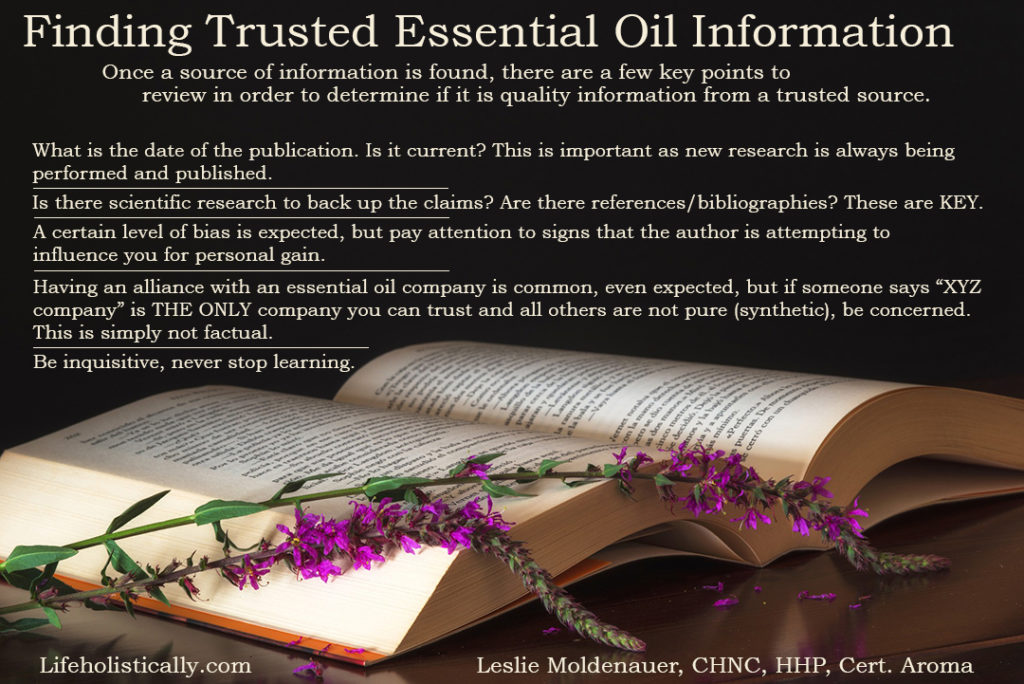
Learning How to Research-A Crash Course
This topic could be a series of blogs, but for now, I would like to just cover a few key points, and provide a few really good resources.
Superior to a blanket Google search would be to utilize research databases for evidence-based information. Find quality research that has been validated.
Here is a sampling of databases to help you perform your research:
PubMed
Google Scholar
MedScape
Tea Tree Oil Database
PubMed Central-Open Access research
The Best Method (the Gold Standard)
The best type of research paper is going to be a double-blind randomized controlled trial. According to Pubmed, “The double-blind randomized controlled trial (RCT) is accepted by medicine as an objective scientific methodology that, when ideally performed, produces knowledge untainted by bias” (5). This method removes the bias piece to research. The abstract of your paper will state what type of research was done. There are many other types such as but not limited to: cohort studies, case-controlled studies, and various surveys. Use the resources below to learn what those are as well as their advantages and disadvantages.
I can not tell you how many countless hours I combed through research papers hundreds of pages long with a highlighter and toothpicks to hold my eyes open (kidding on the latter), to write a quality literature review for grading. Double-blind randomized controlled trials bring the most reliable results.
Resources to help you Perform Quality Research
The books that I used in school have been valuable well beyond their price tag, so I want to share with you four that I used, and I recommend you invest in them as well.
The first book, in all honesty, as I began to read it…made me want to poke my eyes out. A few weeks into my semester I learned the value of it and went back to page one and poured myself into it. The Curious Researcher, A Guide to Writing Research Papers, by Bruce Ballenger is a must for anyone researching, writing, or even wanting to perform your own research trial.
The next is, How to Read a Paper, the basics of evidence-based medicine, by Trisha Greenhalgh. Do you gloss over when you look at a research paper not understanding what any of it means? Invest in this book….you will become a pro!
Another gem is Making Sense of Research, by Martha Brown Menard. The book is geared towards complementary and integrative health practitioners. It goes over the scientific method, the research process, and a very detailed step-by-step for locating research articles, understanding them, and determining their value.
Last is Complementary & Alternative Medicine, A Research-Based Approach, by Lyn Freeman. This book covers what the others do, but takes it one step further to look at case studies, clinical applications, healing methods, medical advances, and the history of each discipline. Very thorough, and worth every penny.
I hope that I was able to shed some light on how common confirmation bias really is in our industry, and what we can do as practitioners to combat it. If you are an essential oil enthusiast, it is SO INCREDIBLY IMPORTANT for you, as a home researcher, to know where to find quality information that you can trust. Always look with a critical eye, at what you are reading and the evidence the writer provides to back it up. We can, and should do better!
Like so many practices in life, I encourage you to become educated on the proper use of essential oils. When using them, please do so cautiously, understanding that there is often misinformation on the internet. You can be assured that I support only educated and proven resources. While essential oils should not be feared they should be respected and used properly to ensure the safety of the individuals using them.
Please note that I am not a medical practitioner. The content of this website is provided for general informational purposes only and is not intended as, nor should it be considered a substitute for, professional medical advice. Do not use the information on this website for diagnosing or treating any medical or health condition. If you have or suspect you have a medical problem, promptly contact your professional healthcare provider. By using this website, you assume full responsibility and liability for your own actions.
References
(1) What is confirmation bias? https://www.psychologytoday.com/blog/science-choice/201504/what-is-confirmation-bias
(2) Definition of Algorithm. Retrieved from
https://en.oxforddictionaries.com/definition/algorithm
(3) What Does SEO Stand For? http://www.alpinewebmedia.com/what-does-seo-stand-for/
(4) HaloEffect http://psychology.iresearchnet.com/social-psychology/social-cognition/halo-effect/
(5) The double-blind, randomized, placebo-controlled trial: gold standard or golden calf? https://www.ncbi.nlm.nih.gov/pubmed/11377113
















